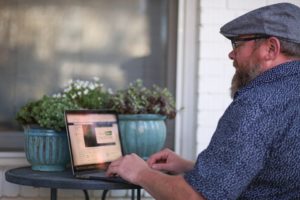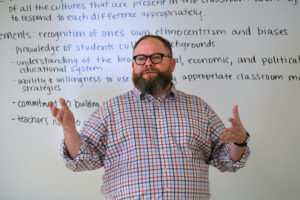The University of Mary Washington is among countless educational institutions worldwide that have switched to virtual classes due to the coronavirus threat, or COVID-19. Suddenly, students are at home, and so are their teachers. The transition has been daunting for many professors, especially those who have never taught online.
 But one UMW faculty member saw it as an opportunity.
But one UMW faculty member saw it as an opportunity.
College of Education Professor John Broome launched the Higher Ed Learning Collective (HELC), a grassroots, we’re-all-in-it-together kind of Facebook group for sharing high- and low-tech remote-teaching tools, sprinkled with a dose of self-care. He never imagined the Collective would gain traction across the globe in just a few weeks, morphing into a worldwide movement with over 24,000 members in more than 100 countries … and counting.
HELC already has introduced a website and YouTube channel, and dozens of universities, libraries and online learning sites are recommending the group, as is UNESCO, the United Nations Educational, Scientific and Cultural Organization. The Collective is creating a sense of community in a world that desperately needs one, and Broome hopes HELC will outlive the coronavirus pandemic, driving faculty to better address the diverse needs of students.
“Not everyone has access to good online or hybrid pedagogy,” said Broome, who – like so many fellow academics – was anxiously posting on social media. “We’re struggling as educators and as humans … so why not teach each other for free?”
The group contains memes, photos of members’ home-teaching environments, and thousands of posts about effective use of video-conferencing tools, whether to give grades or pass/fail, and communicating with students about the pandemic. Instructors have discussed students lacking access to broadband or computers, and if it’s better for classes to meet together virtually or let students complete lessons on their own.

Kashef Majid was initially intimidated by the prospect of teaching online. “On HELC, I’ve gotten tips to make my classes more interactive,” said Majid, who teaches marketing at Mary Washington. When his first day didn’t go as planned, he said, he got reassurance from other faculty that they were experiencing the same problems.
HELC includes online coffee breaks and happy hours, daily live meditation and a virtual yoga studio – and lots of humor. A popular topic is the challenge of sharing physical living and learning spaces with families, as Broome found when a mother recently interrupted a student’s advising session to put away laundry.
Plans for a blog, a book and a peer-reviewed e-journal are already in the works, as well as mentorship opportunities for professors looking for one-on-one guidance, and an educator-speaker program. A proponent of culturally responsive teaching practices, Broome encourages learning from those with marginalized identities, such as scholars who are black, indigenous and people of color and members of the LGBTQ+ and disability communities.
“They can upload profiles and connect with instructors who want to bring in a guest to give their students a different perspective,” he said.

Some professors intend to use the Collective in the short term, said Broome, but he’s relying on his strategy management background to ensure that HELC has a lasting impact on higher education. Many of his UMW colleagues are already on board.
“It’s like being a new instructor all over again,” Middle Eastern Studies Professor Nabil Al-Tikriti said of teaching online. With the group’s support, his classes are running smoothly, Al-Tikriti said, and in some cases, individual participation has improved.
Overwhelmed with helping her students transition to virtual classes, College of Arts and Sciences Associate Dean Betsy Lewis didn’t have a lot of time at first to explore HELC.
“Then I noticed something beautiful and unexpected,” Lewis said. “The group brings together academics from my life that I thought would never be connected – from old grad school friends to young colleagues.”
Creating community, Broome said, is the Collective’s central mission.
“Faculty engagement, empowerment and advocacy is our goal,” he said. “This is about the future of higher education … a space where everyone can become a better teacher.”